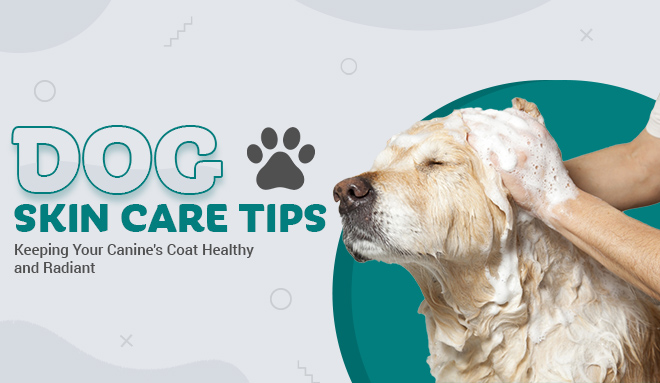Taking care of your dog’s skin is a vital part of their overall health and well-being. From nutrition and grooming to hydration and environmental factors, there are a lot of factors that impact their skin health leading to increased need of dog skin care routines.
In this informative guide, we’ll cover essential tips and advice for maintaining your dog’s skin and coat health. With this knowledge, you’ll be able to address common skin problems and prevent further issues, ensuring the health and happiness of your beloved dog.
Let’s dive in and learn how to keep your furry friend’s skin in top condition.
Primary Aspects of Dog Skin Care
Dog skin care health is impacted by a lot more factors than you think. In this segment, we’ll understand the various aspects and explore the basics of skincare for dogs.
Nutrition
It goes without saying that if your beloved doggo is healthy from the inside, it will reflect on their skin. This means diet and nutrition play an integral part in your dog’s skin & coat health. However, the nutritional requirements of all dogs are different. Typically, a diet rich in essential fatty acids like omega-3 and omega-6, high-quality proteins, vitamins, and minerals is considered ideal.
Furthermore, when designing their diet, make sure you keep in mind the foods your dog is allergic to and stay clear of them. You can select a diet based on elimination or consult a vet for specific advice.
Grooming
Regular grooming is of utmost importance to maintain the skin and coat health of your dog. Regardless of the size, fur type, or breed, daily brushing is essential to remove dirt, debris, and loose fur that can cause skin irritation. Plus, it also stimulates the skin and distributes natural oils, promoting a healthy coat.
Another crucial part of grooming is having a suitable bathing schedule with the right products that suit your dog’s skin. Consider the allergies, sensitivities, and preferences of your dog while selecting the right shampoo or other grooming products.
Parasite control
Parasites such as fleas and ticks are the most common causes of skin irritation, which leads to itching, scratching, and allergies. Using vet-recommended flea and tick treatments can help keep your dog safe against these pesky parasites and maintain their skin and coat health.
Environmental factors
Extreme cold or cold weather both pose potential risks for your dog’s skin and overall health. Prolonged exposure to the sun runs the risk of causing sunburn and dryness, while cold weather can lead to chapped and flaky skin. Avoid taking them out during peak sun hours or use pet sunscreen, and during winters provide them with a warm shelter and use a sweater or traction socks to protect them from the chilly wind.
Hydration
Proper hydration is crucial for maintaining healthy skin as it contributes to skin moisture and supports skin elasticity and resilience. Dehydration can lead to dry, flaky skin and other health issues. Therefore, make sure that your dog has access to fresh and clean drinking water at all times.
Healthcare
There are instances when skin problems can surface as a symptom of an underlying health issue or side effect of a treatment. Thus, it’s best to maintain regular vet visits to detect and address such issues at the earliest and save your dog from discomfort.
Valuable Tips for Taking Care of Your Dog’s Skin Health
Here are some measures you can take to take care of your dog’s skin:
- Keep up the vet visits; they are important
- Use vet-recommended treatment for protection against parasites
- Avoid heavily wooded areas when going for walks to avoid encounters with parasites
- Regularly mow your lawn and don’t let water stand
- Maintain a grooming routine
- Make sure to give them a nutritionally balanced diet
- Monitor the symptoms& report to the vet if required
- Add healthy supplements to their diet after consulting your vet
Parting Words
With this guide, we hope you understand how important it is for your dog to have a skincare routine! By implementing the tips covered in this blog, you can ensure your furry friend’s coat stays healthy, shiny, and free from discomfort.
FAQ
Q1. What foods are best for my dog’s skin health?
A diet rich in omega-3 and omega-6 fatty acids, vitamins, minerals, and high-quality proteins is excellent for supporting skin and coat health in dogs.
Q2. How often should I groom my dog to maintain healthy skin?
Daily brushing and regular bathing with a vet-recommended shampoo help remove dirt, reduce shedding, and keep your dog’s skin free from irritation.
Q3. Can parasites cause skin problems in dogs?
Yes. Fleas, ticks, and mites are common causes of itching, scratching, and skin allergies. Preventive flea and tick treatments are essential for skin health.
Q4. How do environmental factors affect my dog’s skin?
Hot weather can cause sunburn and dryness, while cold conditions may lead to flaking and chapped skin. Always protect your dog with sunscreen, sweaters, or shelter as needed.
Q5. When should I take my dog to the vet for skin issues?
If your dog shows persistent itching, redness, bald spots, or flaky patches, consult a vet immediately to rule out allergies, parasites, or underlying health problems.

